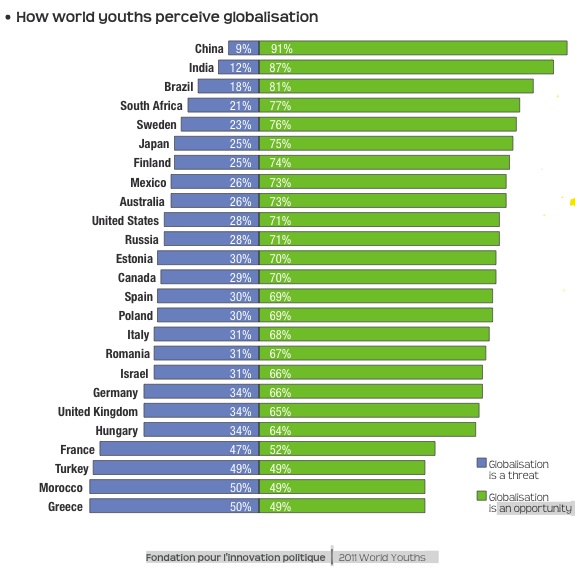Young Europeans are having trouble completing their transition towards full independence. The problem bites deeper here, because our social model is based on the status of full-time, long term employee, that unlocks important social and economic rights (in France, where I live now, if you don’t work you have no right to health care). This generates tensions, because it forces young people to fight for this status at all costs, even if it got very difficult to obtain and even if many of them would like to explore different roads. Result: 20% of 15-34 years old, in Europe, is not in employment, education or training. It is not even a matter of being young anymore: young people are in the line of fire, but citizens of all ages are losing autonomy.
The paradox is that the currently young generation is probably the most creative, generous, idealist, collaborative ever. Everywhere you look young people are creating, seemingly out of thin air, their own jobs in entirely new businesses like my friends at CriticalCity or the extraordinary twentysomethings at Blackshape Aircraft; they experiment new ways to share resources, from their couches to motor vehicles, or going out to live off the beaten track; others still are building new way to meaningful activism, making their voice heard and matter in an age of crisis of representative democracies. These people don’t know each other, and they act independently; and yet, one can’t help get the feeling that their projects are somehow coherent, as if they were pieces of the same emergent future. The OpenStreetMap 2008 video (above) is of course completely unrelated, but it makes for a great metaphor of this emergence; and it gives me the same feeling of elation and hope.
The Council of Europe has an idea: try to dig out all of these experiences; aggregate them; validate them through peer-to-peer assessment; and use them to propose to the European Commission and its own member states a new strategy. We might call it adaptive; in plain terms, it is about:
- figuring out what the young people of Europe are already doing to build the world we will all inhabit in twenty years. The proof of the cake is in the eating: if they struggle so hard to build something, it means they really want it. So that gives you a goal for your policy.
- if possible, help them with it, in the sense of creating the conditions for these strategies – that today require a lot of resourcefulness and self-sacrifice, and are de facto accessible only to a minority – become viable for the average young person.
- if it’s not possible to help them, get out of their way, by refraining from projecting onto them the social and economic model of the 70s. It is the one most senior European decision makers grew up in, but that does not make it the best or the best suited to this day and age.
This will be done through a web project, characterized by fully open and constructive interaction. Its final result will be presented in a high profile conference, probably in May 2012. I have the honor of managing this project, and the good fortune of having been able to put together a stellar team (I will introduce them in a subsequent post). I need to credit the Social Cohesion Research and Development Division of the Council of Europe for believing in the project, and for the courage demonstrated in rolling out such an open initiative.
The project is called Edgeryders. The platform will launch in late October; for now we have put online a provisional blog to start the conversation. Come say hello, and, if you think we are credible, pass word around: we will need all the wisdom and all the help we can get. And you, and we too, that means all of us are the real experts on future building: we struggle with it every day.
